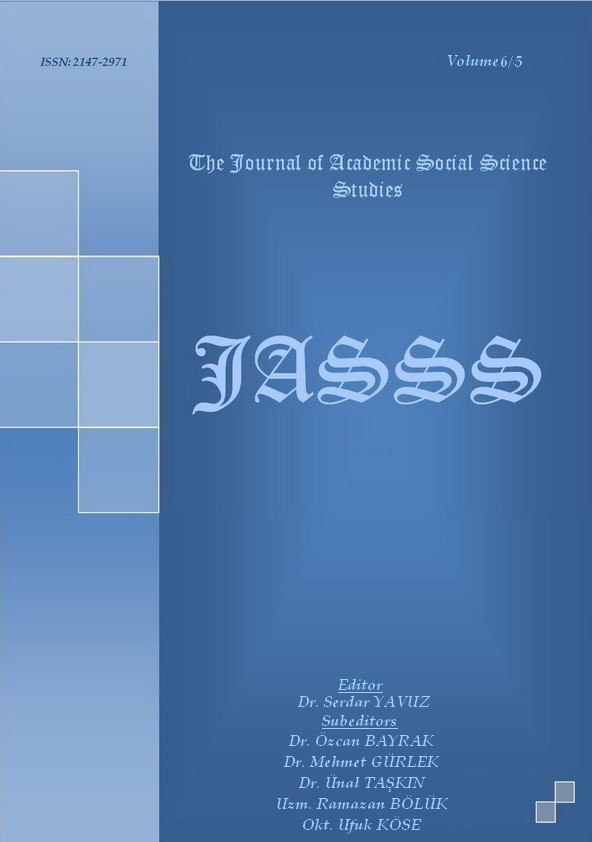Author :
Abstract
Millet ve milliyyet kavramlarının özellikle 18. yüzyıldan günümüze kadar toplumsal, siyasî, askerî ve ekonomik vb. hemen her alanda giderek daha öne çıktıkları görülür. Millet ve milliyyet kavramaları, ülkü, mekân, ata, meslek, çıkar, devlet, dil, töre, kültür ve ümmet ortaklığı temeline dayanırlar. Fizyolojik, psikolojik, sosyolojik, dinî, siyasi ve ekonomik bir zeminde gerçekleşirler. Bir süreç içinde ortaya çıkarlar. Esasen bu bahsedilen temel ortak noktalarda olabildiğince birleşerek yetkinleşmeyi hedefleyen ideolojik bir karaktere sahiptirler. Yetkin millet temel ortak noktalarda olabildiğince birleşme ideolojisiyle diğer milletlerden ayrılır. Fakat ideoloji, millet kavramının özünde bulunan içeriğinden, özü gereği ideolojik olmasından farklı olarak, millet kavramının içindeki bir veya birkaç ortak noktaya dayandırmaya yöneldiğinde millet içinde farklı ideolojiler ve millet içinde farklı milletler oluşmasına yol açar. Ayrıca ortak noktalarda birleşme her zeminde aynı derecede ve aynı şekilde gerçekleşmediği için millet ve milliyyet kavramlarını doğal olarak ideolojilerden bağımsız işlemek zordur. Böyle olduğu için de her ideoloji kendi bakışıyla kavramların içeriğini doldurmuştur. Özellikle siyasi ideolojilerin millet ve milliyyet kavramlarının içeriklerini bir veya birkaç ortak noktaya dayandırarak tek yanlı doldurmaları ve buna paralel milliyetçilikler geliştirme çabaları hakikatten sapmalara ve birçok alanda sorunlara, çatışmalara ve dağılmalara yol açmaktadır. Oysa bu kavramları, ideolojileri paranteze alan fenomenolojik, yani salt bilimsel bir yaklaşımla ele almak pek denenmiş bir şey değildir. Bu makalenin amacı böyle bir yöntemle bu kavramlara eğilerek felsefî bir çözümleme yapmaktır. Bu çözümleme temel alınarak, toplulukların hangi yönüyle nasıl ve ne kadar millet ve milliyyet vasfına sahip oldukları ideolojilerden bağımsız olarak denetlenebilir. Ayrıca bir millet yetkin millet olma yolunda ilerlerken küçük toplulukların bu yoldan sapmaya yönelik kalkışmaları da daha sağlam değerlendirilebilir.
Keywords
Abstract
It is seen that the concepts of nation and nationality has come forward more and more in almost every field such as social, political, military and economic and so on, especially from the 18th century to the present. The concepts of nation and nationality stand on the basis of ideal, place, ancestor, profession, benefit, state, language, custom, culture and ummah (religious community) partnership. They come true on a physiological, psychological, sociological, religious, political, and economic ground. They occur in a process. In fact, they have an ideologic character that aims competence by uniting, as much as possible, around the basic common points mentioned above. Competent nation is seperated from other nations with the ideology of uniting, as much as possible, around the basic common points. However, basing ideology not on the ideolojic nature of the nation concept, inherent in its content, but on a single common point or a few in the concept of nation, leads to the formation of various ideologies in nation and various nations in nation. Furthermore, because uniting on the common points do not occur at same level and in the same way, it is naturally difficult to handle the concepts of nation and nationality regardless of ideology. Thus, every ideology has filled in the contents of the concepts by its own point of view. The efforts made especially by political ideologies to fill in the contents of the concepts of nation and nationality one sidedly by basing them on just one common point or a few and to develop nationalism paralel to it, cause deviations from the truth and problems in many fields, conflicts and disintegrations. However, handling these concepts by phenomenological, ie, purely scientific approach that brackets ideologies, is not something that has been tried yet. The purpose of this article is to make a philosophical analysis by leaning over these concepts in such a way. Based on this analysis, it can be checked independently of ideologies that how, in which aspects and how much communities have the qualities of nation and nationality. Furthermore, while a nation is making a progress towards being a competent nation, the attempts of small communities to deviate from the course can be considered more accurately.





